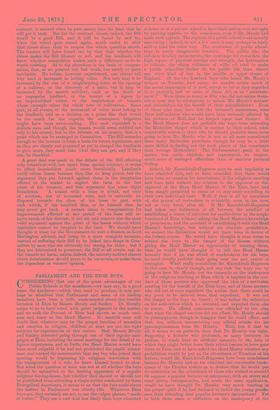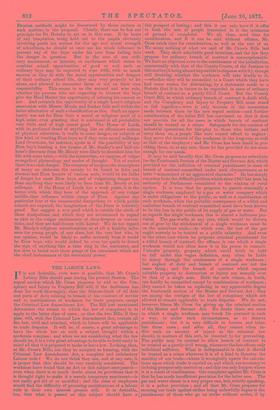PARLIAMENT AND THE ETON BOYS.
CONSIDERING that one of the great advantages of our 1..,) Public Schools is the manliness—we may say, in a good sense, the hardness—which they tend to produce, it may per- haps be admitted that Parliament and some of its leading members have been a trifle weak-minded about this terrible invasion of Eton by Messrs. Moody and Sankey. Dr. Hornby seems to us to have acted with great judgment in the matter, and we wish the Provost of Eton had shown as much cool- ness and sense as the Head Master. No sensible man will doubt that, whatever may be the proper function of sensation and emotion in religion, children at least are not the right subjects for experiments of this nature. Had Messrs. Moody and Sankey intended going through one of their regular cam- paigns at Eton, including the usual meetings for the detail of re- ligious experiences, and so forth, the Head Master would have been most culpable if he had not prohibited his pupils' attend- ance, and warned the missionaries that any boy who joined their meeting would be beginning his religious conversion with the transgression of a rule he knew himself bound to obey. But when the question at issue was not at all whether-the boys should be submitted to the heating apparatus of a regular religious forcing-house, but whether they should or should not be prohibited from attending a single service conducted by these Evangelical Americans, it seems to us that the fuss made about the matter in Parliament was utterly idle. Whatever Eton boys are, they certainly are not, to use the vulgar phrase, " made of butter." They are a vast deal less likely than boys educated at home or at a private school to have their nerves over-wrought by exciting appeals to the conscience, even if Mr. Moody had made such appeals. The regimen of a public school is not morally enervating ; indeed, in not a few cases it may perhaps be fairly said to tend the other way. The conscience of public school- boys is rarely dangerously sensitive. The public life, the out-door healthy amusements, the contempt for cowardice, the high repute of physical courage and strength, the habituation to ridicule, the sharp collisions of wills, all tend to make a public schoolboy earlier fit for public life than almost any other kind of boy in the middle or upper classes of England. Of the two hundred boys who heard Mr. Moody's . sermon on Tuesday, how many, we wonder, retain much of the moral impression of, it now, except so far as they regarded it, as probably half or more of them did, as an " entertain- ment I" Were there so many as fifty who did not amuse them- selves next day by attempting to mimic Mr. Moody's manner and articulation for the benefit of their schoolfellows ? Even of those who may have felt the lecturer's earnestness, were there half-a-dozen who would have been seriously affected by his pictures of Hell, had he harped upon that theme ? If the Head Master does not prohibit the boys from attending the Methodist chapel which is nearest to their school, what conceivable reason is there why he should prohibit them from going to hear Mr. Moody, who is not at all more sensational than many Methodist preachers, though he may be a little more skilful in finding out the weak places of the conscience than average Methodists? The Parliamentary panic in the matter was really childish, and represented, we suspect, much more of outraged officialism than of anxious parental feeling.
Indeed, Mr. Knatchbull-Hugessen may be said implicitly to have admitted this, and to have conceded that there would have been no occasion for interference, if the religious meeting had been held without any relation to the approval or dis- approval of the Eton Head Master, if the Eton boys had been simply permitted to come or to stay away according to their own individual taste. Well, if that is all he complains of, the poison of revivalism its evidently, even in his eyes, not so very fatal, after all. If Mr. Knatchbull-Hugessen had taken any distinction at all between the mischief of establishing a centre of infection for scarlet-fever in the neigh- bourhood of Eton without asking the Head Master's knowledge or permission, and the mischief of establishing it with the Head Master's knowledge, but without his absolute prohibition, we suspect the distinction would not have been in favour of the former course. He would have thought it even worse to subject the boys to the danger of the disease without giving the Head Master an opportunity of warning them, than he would have thought it to tell the Head Mosier honestly that if he was afraid of scarlet-fever for his boys, he must strictly prohibit their going near the new centre of contagion. What really scandalises Mr. Knatchbull-Hugessen in this case is, clearly enough, not any risk the boys ran by going to hear Mr. Moody, but the innuendo on the inadequacy of the religious teaching at Eton which is implied in the con- duct of those parents who approved the idea of a revivalist meeting for the benefit of the Eton boys, and of those masters who did not at once repudiate the notion that there could be any good to be derived from that expedient. It was not the danger to the boys he feared ; it was rather the reflection on the authorities which he resented, and expected them also to resent. His official conscience was offended by the idea that what the chapel services did not effect, Mr. Moody should be presumptuous enough to imagine that he could effect, and that, too, without encountering any official rebuke for his presumptuousness from Dr. Hornby. Well, but if that be all, it seems to us perfectly clear that Dr. Hornby was right. Supposing a lecturer who professed, as many lecturers do profess, to teach boys an artificial memory, by the help of which they might better learn their school lessons, to have gone down to Eton, and to have asked the Head Master whether any prohibition would be put on the attendance of Etonians at his lecture, would Mr. Knatchbull-Hugessen have been scandalised because Dr. Hornby had so far admitted the conceivable inade- quacy of the Etonian system as to declare that he would put no restriction on the attendance of those who wished to attendi Or sappose a popular lecturer on astronomy, with an orrery and some pretty transparencies, had made the same application, would he have thought Dr. Hornby very much wanting in the proper spirit if he had declined to forbid the young gentle.. men from attending that popular lecturer's instructions? Yet in both these cases a reflection on the inadequacy of the
Etonian methods might be discovered by those curious in such matters, in the proposal. Clearly, there can be but one principle for Dr. Hornby to act on in this case. If he hears of any temptation being held out to the pupils obviously involving perils too serious for the age and moral strength of schoolboys, he should at once use his whole influence to prevent any of the boys under his care from falling into the danger in question. But in the case of any ordi- nary amusement, or interest, or excitement which seems to combine mixed opportunities of good or evil such as ordinary boys may be expected to cope with, with as much success as they do with the moral opportunities and dangers of their ordinary school life, they may very properly be let alone, and allowed to encounter them or not on their own responsibility. This seems to us the natural and wise rule, whether the persons who are expecting to interest the boys give the Head Master the opportunity of refusing his consent or not. And certainly the opportunity of a single hour's religious association with Messrs. Moody and Sankey falls well within the latter alternative of such a classification as this. Such an oppor- tunity was not for Eton boys a moral or religious peril of a high order, even granting that it contained in all probability very little seed of high moral good. The House of Lords, with its profound dread of anything like an effeminate system of physical education, is really in some danger, on subjects of this kind, of treating Eton boys as if they were moral milksops Lord Overstone, for instance, spoke as if the possibility of any Eton boy's hearing a few hymns of Mr. Sankey's and half-an- hour's discourse from Mr. Moody were likely to inoculate him for life with some taint,—with the mannerism, we suppose, of vulgar evangelical phraseology and modes of thought. Yet of course there is no such danger. The company of bargees, the atmosphere of many an alehouse, the society to be found in fairs and circuses and Eton haunts of various sorts, would he far fuller of danger for most Eton boys, and of vulgarising danger too, than anything they were likely to hear from Mr. Moody or his colleague. If the House of Lords has a weak point, it is the terror with which they hear of the approach of any vulgar middle-class influence within range of Eton. Against any particular fear of the immemorial dissipations to which public schools are exposed, the imagination of the Peers is tolerably proof. But suggest a new peril which is outside the circle of these dissipations, and which they are accustomed to regard as akin to the vulgar excitements of shop-keepers or conven- tides, and they are half-frozen with horror. We do not regard Mr. Moody's religious sensationalism as at all a healthy influ- ence for young people of any class, but the very last who, in our opinion, would be likely to suffer seriously from it would be Eton boys, who would indeed be even too quick to detect the sign of anything like a false ring in the sentiment, and too slow to brood over those pangs of the conscience which are the chief instruments of the revivalists' power.



































 Previous page
Previous page